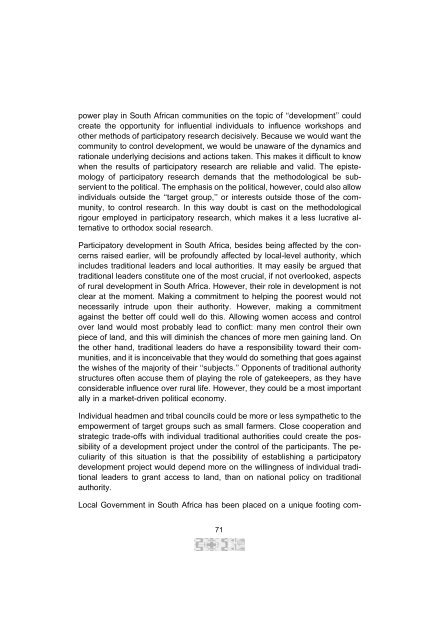AFRICANUS Vol 30 No 2 ISSN 0304-615X - University of South Africa
AFRICANUS Vol 30 No 2 ISSN 0304-615X - University of South Africa
AFRICANUS Vol 30 No 2 ISSN 0304-615X - University of South Africa
You also want an ePaper? Increase the reach of your titles
YUMPU automatically turns print PDFs into web optimized ePapers that Google loves.
power play in <strong>South</strong> <strong>Africa</strong>n communities on the topic <strong>of</strong> ``development'' could<br />
create the opportunity for influential individuals to influence workshops and<br />
other methods <strong>of</strong> participatory research decisively. Because we would want the<br />
community to control development, we would be unaware <strong>of</strong> the dynamics and<br />
rationale underlying decisions and actions taken. This makes it difficult to know<br />
when the results <strong>of</strong> participatory research are reliable and valid. The epistemology<br />
<strong>of</strong> participatory research demands that the methodological be subservient<br />
to the political. The emphasis on the political, however, could also allow<br />
individuals outside the ``target group,'' or interests outside those <strong>of</strong> the community,<br />
to control research. In this way doubt is cast on the methodological<br />
rigour employed in participatory research, which makes it a less lucrative alternative<br />
to orthodox social research.<br />
Participatory development in <strong>South</strong> <strong>Africa</strong>, besides being affected by the concerns<br />
raised earlier, will be pr<strong>of</strong>oundly affected by local-level authority, which<br />
includes traditional leaders and local authorities. It may easily be argued that<br />
traditional leaders constitute one <strong>of</strong> the most crucial, if not overlooked, aspects<br />
<strong>of</strong> rural development in <strong>South</strong> <strong>Africa</strong>. However, their role in development is not<br />
clear at the moment. Making a commitment to helping the poorest would not<br />
necessarily intrude upon their authority. However, making a commitment<br />
against the better <strong>of</strong>f could well do this. Allowing women access and control<br />
over land would most probably lead to conflict: many men control their own<br />
piece <strong>of</strong> land, and this will diminish the chances <strong>of</strong> more men gaining land. On<br />
the other hand, traditional leaders do have a responsibility toward their communities,<br />
and it is inconceivable that they would do something that goes against<br />
the wishes <strong>of</strong> the majority <strong>of</strong> their ``subjects.'' Opponents <strong>of</strong> traditional authority<br />
structures <strong>of</strong>ten accuse them <strong>of</strong> playing the role <strong>of</strong> gatekeepers, as they have<br />
considerable influence over rural life. However, they could be a most important<br />
ally in a market-driven political economy.<br />
Individual headmen and tribal councils could be more or less sympathetic to the<br />
empowerment <strong>of</strong> target groups such as small farmers. Close cooperation and<br />
strategic trade-<strong>of</strong>fs with individual traditional authorities could create the possibility<br />
<strong>of</strong> a development project under the control <strong>of</strong> the participants. The peculiarity<br />
<strong>of</strong> this situation is that the possibility <strong>of</strong> establishing a participatory<br />
development project would depend more on the willingness <strong>of</strong> individual traditional<br />
leaders to grant access to land, than on national policy on traditional<br />
authority.<br />
Local Government in <strong>South</strong> <strong>Africa</strong> has been placed on a unique footing com-<br />
71
















